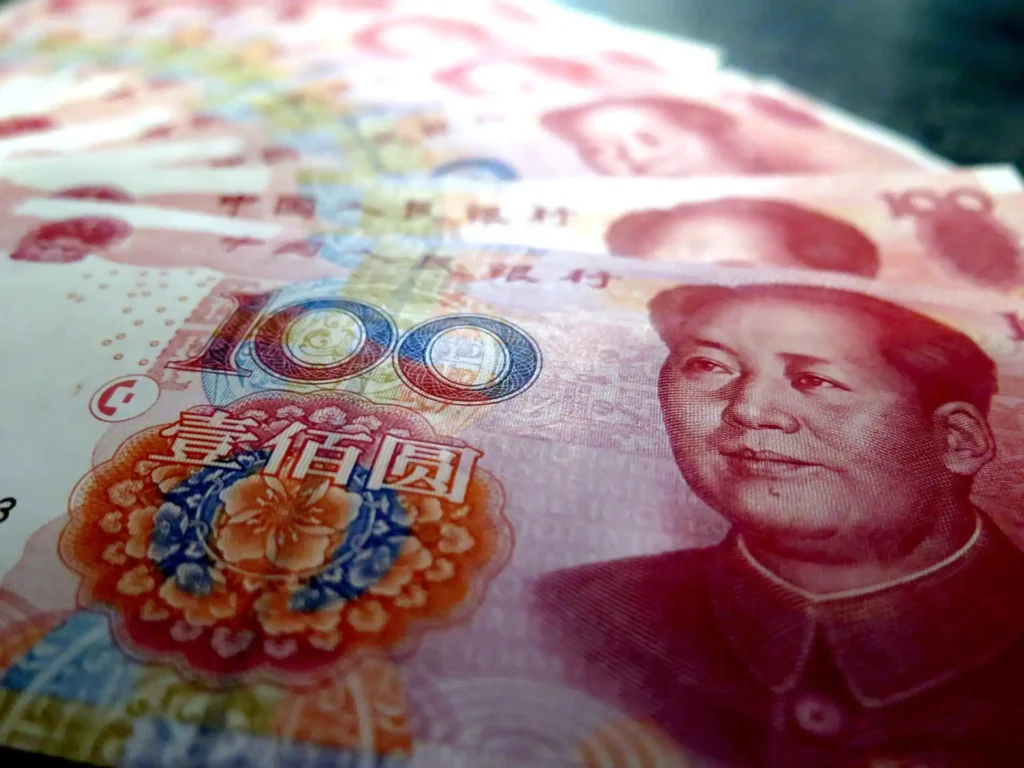
Chinese currency: Know before you go
Are you planning a trip to China?
One of the first things you’ll need to get a handle on is the local currency.
Understanding the basics of Chinese currency is essential for any traveller looking to navigate shopping, dining, and exploring throughout this vast country.
Officially, the currency used in mainland China is the yuan, commonly referred to as renminbi (RMB).
This brief guide will help you grasp essential currency details, ensuring your travel preparations are as smooth as your forthcoming adventure.
Buy your Chinese currency now
Overview of Chinese currency
When venturing into China, the terms “yuan” and “renminbi” are often used interchangeably, but it’s useful to know their specific meanings.
The term “renminbi,” which means “people’s currency” or “currency of the people,” is the official name of China’s currency, while “yuan” is a unit of the renminbi. This is akin to how British currency is officially called the “Pound Sterling,” with “pound” being the unit.
The Chinese yuan, represented by the symbol ¥ and internationally known by the currency code CNY, plays a crucial role in both the local and global economy.
For travellers, recognising the currency symbols and understanding basic denominations is vital.
Chinese banknotes come in denominations of ¥1, ¥5, ¥10, ¥20, ¥50, and ¥100, which are frequently used for daily transactions.
Coins are also in circulation, typically in denominations of 1 jiao (¥0.1) and 5 jiao (¥0.5), as well as 1 yuan, which is divided into 10 jiao.
In addition to familiarising yourself with the currency’s physical aspects, it’s equally important to grasp some historical context.
The renminbi was introduced shortly after the establishment of the People’s Republic of China in 1949, undergoing several transformations as the nation evolved economically.
Today, the currency is a fundamental part of daily transactions in China and a symbol of the country’s growing influence in global finance.
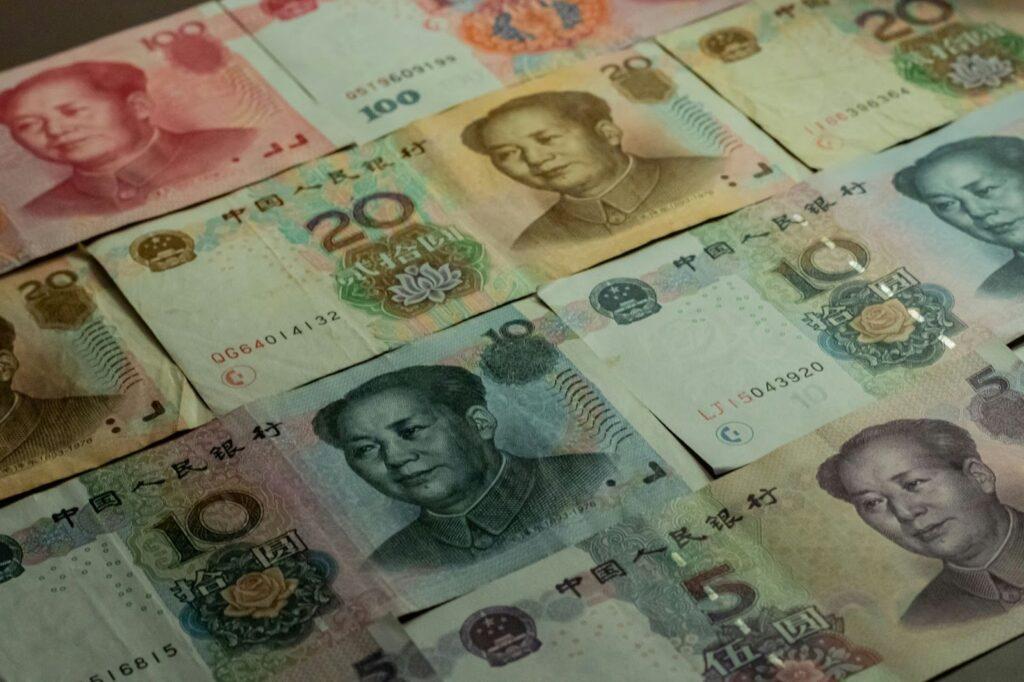
The different currencies of China
While the yuan is the dominant currency across mainland China, the country’s unique administrative structure means that different regions have their own official currencies. This can be a bit confusing for first-time travellers to China.
Hong Kong
In Hong Kong, the Hong Kong dollar (HKD) is the legal tender, distinct from the yuan used on the mainland. The Hong Kong dollar is internationally recognised and widely used within this vibrant city-state.
Taiwan
Similarly, Taiwan’s official currency is the New Taiwan dollar (TWD), which circulates exclusively in Taiwan.
Understanding these distinctions is crucial because each currency operates independently with its own value and exchange rates. For instance, while you can easily use the yuan in cities like Beijing or Shanghai, you’ll need to switch to Hong Kong dollars when entering Hong Kong.
Moreover, it’s important to note why China has multiple currencies. This arrangement reflects the political and economic frameworks governing these regions, allowing each to manage its economy according to local needs while still being part of greater China.
Knowing which currency to use and when will help you manage your finances better while travelling across different Chinese territories. Prepare to handle currency exchanges as you move between these areas to ensure a smooth travel experience.
Exchange rates and conversions
Navigating exchange rates is a vital skill for any traveller. Before you depart for China or any of its regions like Hong Kong or Taiwan, it’s important to understand how to effectively convert your British pounds into the local currency.
Keeping an eye on the exchange rate between the Chinese yuan (CNY) and the British pound (GBP) can help you get the most out of your money.
The value of the yuan against the British pound and other major currencies like the United States dollar can fluctuate based on global economic conditions, so it’s wise to monitor these changes through reliable financial news sources or currency conversion apps.
When you arrive in China, you might need to exchange more money, depending on your expenses.
While major cities have plenty of banks and currency exchange kiosks, it’s generally more economical to exchange some currency before leaving the UK. Additionally, always ask about transaction fees to avoid unexpected charges.
For those travelling beyond mainland China to Hong Kong or Taiwan, remember that each region’s currency must be converted separately. The Hong Kong and Taiwanese dollars also fluctuate and have different values against the GBP.
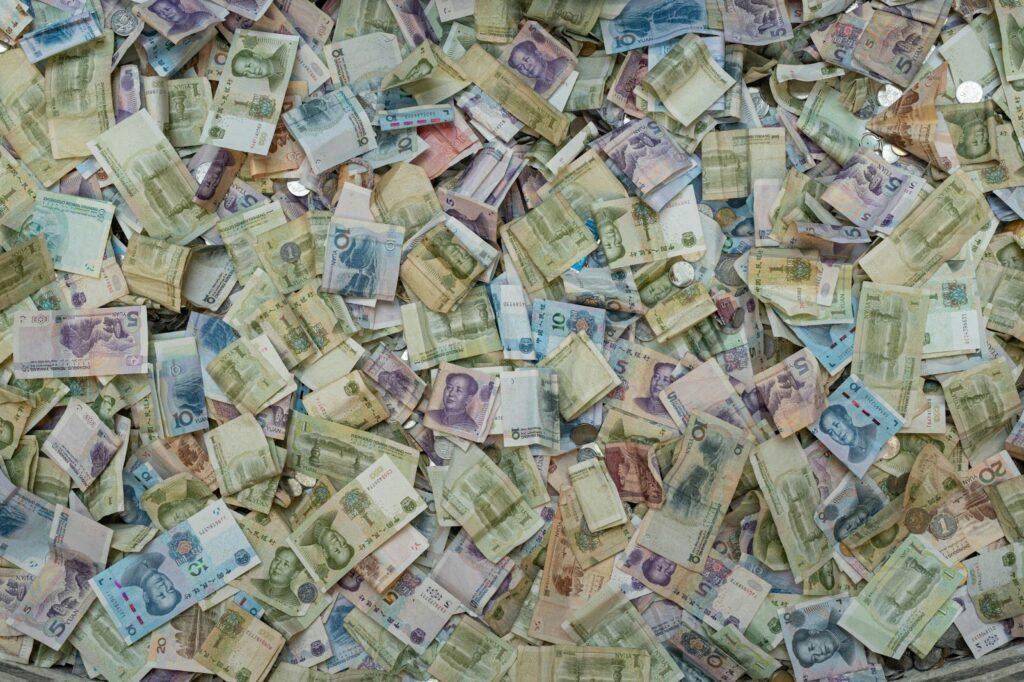
Buy your Chinese currency now
Purchasing Chinese currency
Preparing your finances before travelling to China involves understanding the currency and knowing where and how to purchase it.
Here are some tips on buying Chinese currency efficiently:
Before departure
Buy some Chinese yuan (renminbi) in the UK before you travel. This ensures you have cash on hand for immediate expenses upon arrival, such as taxi fares and meals.
You can purchase yuan from major banks, travel agencies, or dedicated currency exchange bureaus like us here at Manor FX.
Comparing rates between these sources can help you find the best deal… But head’s up, if you’re here, you’ve already found it!
In China
Once you arrive, you may find that you need more yuan for your trip. While many travellers rely on withdrawing money from ATMs for better exchange rates, it is crucial to check with your bank about international withdrawal fees and daily limits.
Currency exchange services are widely available in international airports, major hotels, and banks across Chinese cities, including state-owned institutions like the Bank of China.
Always ensure transactions are conducted in official and authorised locations to avoid any issues with counterfeit currency.
Digital payments
China is advanced in terms of digital payment solutions. Platforms like Alipay and WeChat Pay are extensively used for transactions ranging from small market purchases to restaurant bills.
Setting up these services on your phone can be a convenient way to pay without constantly needing cash.
Tips for best rates
Exchange rates can vary significantly, so monitoring them before and during your trip is beneficial.
Avoid changing money in places that offer rates too good to be true—usually, a high fee is hidden in the transaction. Also, be mindful of the exchange margins applied by different providers. Check out how to avoid poor airport exchange rates here.
Understanding these aspects of purchasing Chinese currency will help you avoid common pitfalls and ensure that your travel budget is used efficiently.
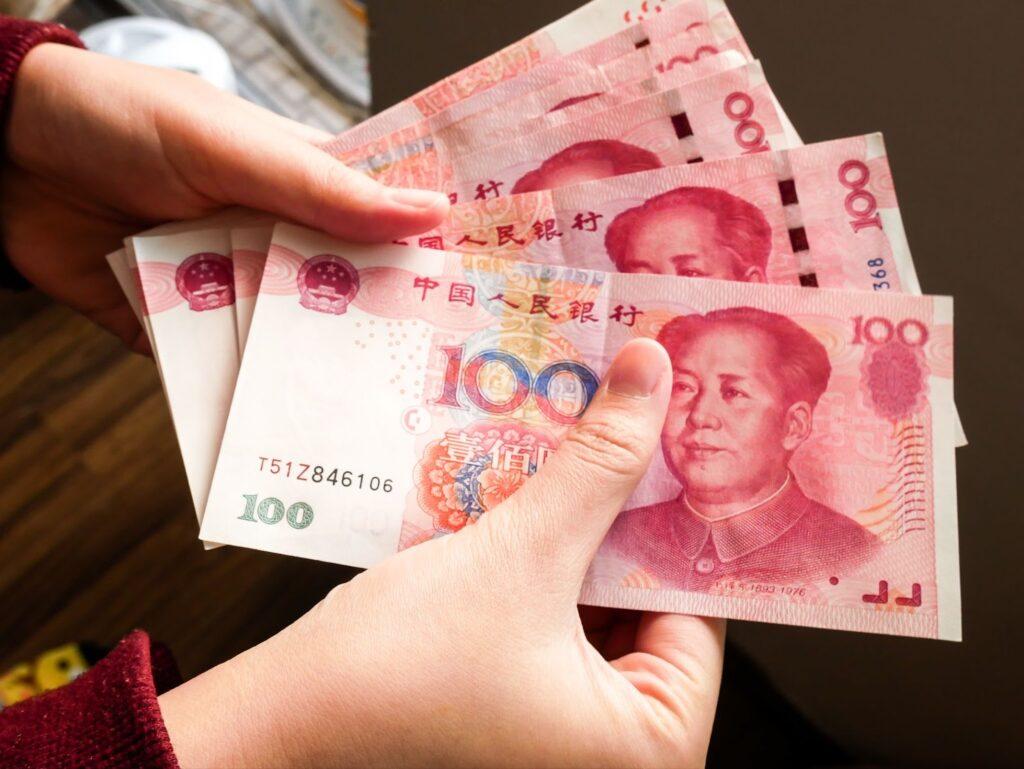
Using Chinese currency while travelling
Navigating China’s diverse payment landscape requires a blend of cash and digital payment methods. Here are some tips on how to effectively use Chinese currency during your travels:
Cash transactions
While urban areas in China are rapidly moving towards digital payments, cash is still king in many rural and remote areas.
Always carry sufficient cash when travelling outside major cities. This is essential for small shops, local markets, or places where digital payments aren’t widely accepted.
Credit cards and ATMs
Major credit cards are accepted in large hotels, shopping malls, and upscale restaurants, mainly in metropolitan areas.
ATMs are widely available and can be a convenient way to withdraw cash in yuan. Be aware of the fees your bank may charge for international withdrawals and the daily withdrawal limits.
Digital payments
For a more local experience, set up and use digital payment platforms like Alipay or WeChat Pay. These are convenient and often required for services ranging from bike rentals to buying train tickets.
To use these services, you’ll need to link them to a local bank account or a credit card, so planning this before your trip can save time.
Budgeting with currency
Understanding how far your yuan will go is essential for budget management. Daily expenses such as meals, transportation, and entrance fees to attractions can vary greatly depending on the location within China.
Urban centres like Shanghai and Beijing might be more expensive than smaller cities or rural areas.
By familiarising yourself with these aspects of currency use in China, you can manage your finances more effectively and avoid common challenges that travellers face.
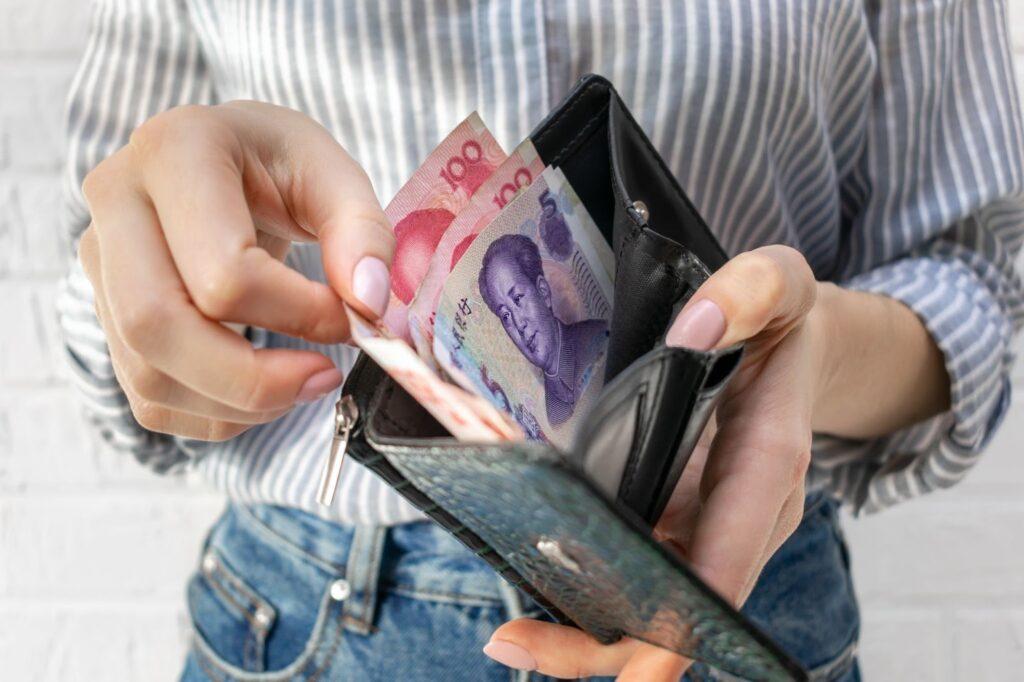
Legal considerations and currency regulations
Awareness of the legal aspects and regulations surrounding currency in China can help you avoid any legal troubles and make your travel experience smoother. Here are some key points to keep in mind:
Importing and exporting currency
The Chinese government sets policies regarding importing and exporting currency to ensure economic stability.
Travellers can bring up to 20,000 CNY into and out of China without declaration. For foreign currency, the limit is the equivalent of $5,000. Amounts exceeding these limits must be declared upon entry and exit to avoid penalties.
Currency restrictions
While exchanging money upon arrival or through ATMs is common, be cautious about where you exchange your money.
Use authorised banks or official money exchange counters only. Avoid black market exchanges that might offer attractive rates but are illegal and could result in counterfeit money.
Familiarise yourself with the latest regulations from China’s Central Bank regarding currency use, especially if you plan to stay for an extended period or conduct business.
Carrying cash
Always be mindful of the amount of cash you carry. To protect against theft, it’s advisable to wear a money belt or a secure pouch, especially in crowded areas.
Also, some money should be kept in different places rather than all in one wallet or bag. For more in-depth info on carrying cash, check out How to travel with cash: Top 10 tips to keep your money safe.
Compliance with local laws
Familiarise yourself with the latest regulations regarding currency use, especially if you plan to stay for an extended period or conduct business.
Local banking laws may affect transactions and money transfers, so staying informed through official sources or consulting with a financial advisor in China can be beneficial.
Understanding these legalities will ensure that your financial dealings in China are secure and compliant with local laws, allowing you to focus more on enjoying your journey across this dynamic country.
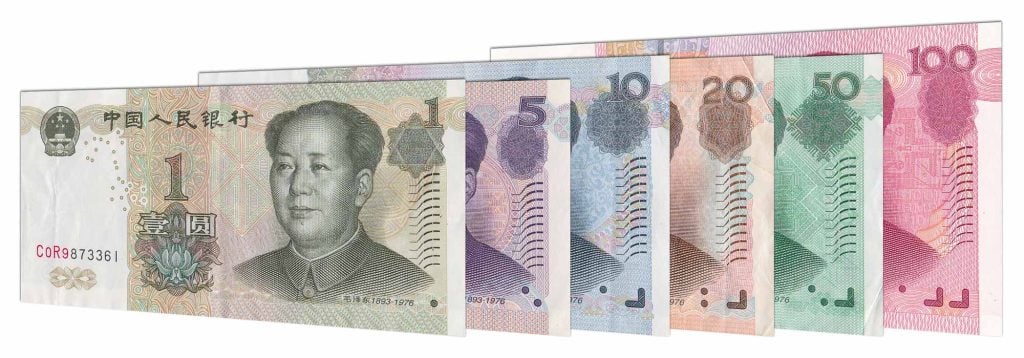
Why choose Manor FX for your Chinese currency?
Effortless convenience
Enjoy the ultimate convenience right at your fingertips. Skip the long lines at exchange offices and ATMs – save time and effort with us.
Exceptional exchange rates
Secure a better rate than you would typically find at airports, local currency exchanges, or banks. We offer competitive rates that are hard to beat.
Superior safety and security
Choose our home delivery option and avoid the risks of carrying cash to and from currency exchange locations. For added peace of mind, all transactions are insured.
Widest range of currencies
With us, the world is truly your oyster. You can access a wide array of currencies, including rare, closed, and partially restricted ones that are often unavailable elsewhere.
No hidden fees
Forget about the annoying fees commonly associated with airport exchanges and currency kiosks. With us, what you see is what you get.
Simplified budgeting
Master your travel budget with ease. Knowing exactly how much foreign currency you have before setting off helps you manage your expenses more effectively.
24/7 online service
Our online exchange service is available 24 hours a day, allowing you to convert your British pounds into travel money at your convenience, anytime, anywhere.
Buyback service
If you return from your adventures in China, convert any remaining Chinese currency to British pounds with Manor FX. We offer great rates for your Chinese currency to GBP conversion.

Takeaways
Understanding Chinese currency is vital to preparing for your trip to this fascinating country.
Being well-informed will enhance your travel experience, from grasping the basic denominations and forms of the yuan to navigating the currency system and legalities of currency exchange.
Whether you’re shopping in bustling markets, dining in exquisite restaurants, or exploring ancient sites, knowing how to manage your finances effectively in China is crucial.
Remember, always start with some local currency in hand for immediate expenses and use official channels for additional currency exchanges.
Prepare for your journey to China and get top Chinese yuan (CNY) exchange rates online at Manor FX today.
Embrace the convenience of digital payments in urban areas while keeping cash for more remote regions.
Following the tips outlined in this guide, you’ll be well-equipped to handle financial transactions smoothly and enjoy a hassle-free adventure in China.
Safe travels, and enjoy your journey exploring the rich culture and scenic landscapes of China!
FAQs
What is the currency of China?
The renminbi is the official currency of China, often referred to by its unit name, the yuan. The international currency code for the yuan is CNY.
What is China's currency called?
China’s currency is called the renminbi, and its unit is known as the yuan.
Why does China have two currencies?
China doesn’t actually have two currencies, but rather two names for them: the renminbi (RMB) is the official name of the currency, and the yuan is the unit of account.
However, China does have different legal currencies in its special administrative regions: the yuan is used in mainland China, the Hong Kong dollar in Hong Kong, and the New Taiwan dollar in Taiwan, reflecting their unique economic and administrative systems.
Is RMB the same as CNY?
Yes, RMB and CNY refer to the same currency. RMB stands for renminbi, the official name of China’s currency, and CNY (Chinese yuan) is the currency code used in international finance to denote the renminbi.
What is the currency in Hong Kong China?
The currency used in Hong Kong is the Hong Kong dollar, often abbreviated as HKD.